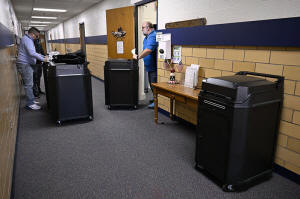Nonprofit groups and Democrats sue Trump administration over election
executive order
[April 01, 2025]
By ALI SWENSON
NEW YORK (AP) — President Donald Trump's executive order seeking to
overhaul the nation's elections faced its first legal challenges Monday
as the Democratic National Committee and a pair of nonprofits filed two
separate lawsuits calling it unconstitutional.
The Campaign Legal Center and the State Democracy Defenders Fund brought
the first lawsuit Monday afternoon. The DNC, the Democratic Governors
Association, and Senate and House Democratic leaders followed soon after
with a complaint of their own.
Both lawsuits filed in the U.S. District Court for the District of
Columbia ask the court to block Trump’s order and declare it illegal.
“The president’s executive order is an unlawful action that threatens to
uproot our tried-and-tested election systems and silence potentially
millions of Americans,” said Danielle Lang, senior director of voting
rights at the D.C.-based Campaign Legal Center. “It is simply not within
the president’s authority to set election rules by executive decree,
especially when they would restrict access to voting in this way.”
The White House didn’t respond to a request for comment.
The legal challenges had been expected after election lawyers warned
some of Trump's demands in the order, including a proof-of-citizenship
requirement for voter registration and new ballot deadline rules, may
violate the U.S. Constitution.
The order also asserts power that legal experts say the president
doesn't have over an independent agency. That agency, the U.S. Election
Assistance Commission, sets voluntary voting system guidelines and
maintains the federal voter registration form.

The suits come as Congress is considering codifying a
proof-of-citizenship requirement for voter registration into law, and as
Trump has promised more actions related to elections in the coming
weeks.
Both the legal challenges draw attention to the Constitution's “
Elections Clause,” which says states — not the president — get to decide
the “times, places and manner” of how elections are run. That section of
the Constitution also gives Congress the power to “make or alter”
election regulations, at least for federal office, but it doesn’t
mention any presidential authority over election administration.
“The Constitution is clear: States set their own rules of the road when
it comes to elections, and only Congress has the power to override these
laws with respect to federal elections,” said Lang, calling the
executive order an “unconstitutional executive overreach.”
The lawsuits also argue the president's order could disenfranchise
voters. The nonprofits' lawsuit names three voter advocacy organizations
as plaintiffs that they allege are harmed by Trump's executive order:
the League of United Latin American Citizens, the Secure Families
Initiative and the Arizona Students’ Association.
The DNC's lawsuit highlights the role of the government's controversial
cost-cutting arm, the Department of Government Efficiency.
It alleges the order's data-sharing requirements, including instructing
DOGE to cross-reference federal data with state voter lists, violate
Democrats' privacy rights and increase the risk that they will be
harassed “based on false suspicions that they are not qualified to
vote.”
[to top of second column]
|

Christopher Prue, president of the Registrars of Voters Association
of Connecticut, right, moves new voting tabulators out of his office
at the Registrars of Voters to be redistributed to other towns,
Thursday, March 27, 2025, in Vernon, Conn. (AP Photo/Jessica Hill)

“This executive order is an unconstitutional power grab from Donald
Trump that attacks vote by mail, gives DOGE sensitive personal
information and makes it harder for states to run their own free and
fair elections," reads a statement from the plaintiffs.
Trump, one of the top spreaders of election falsehoods, has argued
this executive order will secure the vote against illegal voting by
noncitizens. Multiple studies and investigations in individual
states have shown that noncitizens casting ballots in federal
elections, already a felony, is exceedingly rare.
Monday's lawsuits against Trump's elections order could be followed
by more challenges. Other voting rights advocates, including the
American Civil Liberties Union, have said they're considering legal
action. Several Democratic state attorneys general have said they
are looking closely at the order and suspect it is illegal.
Meanwhile, Trump's order has received praise from the top election
officials in some Republican states who say it could inhibit
instances of voter fraud and give them access to federal data to
better maintain their voter rolls.
If courts determine the order can stand, the changes Trump wants are
likely to cause some headaches for both election administrators and
voters. State election officials, who already have lost some federal
cybersecurity assistance, would have to spend time and money to
comply with the order, including potentially buying new voting
systems and educating voters of the rules.
The proof-of-citizenship requirement also could cause confusion or
voter disenfranchisement because millions of eligible voting-age
Americans do not have the proper documents readily available. In
Kansas, which had a proof-of-citizenship requirement for three years
before it was overturned, the state's own expert estimated that
almost all the roughly 30,000 people who were prevented from
registering to vote during the time it was in effect were U.S.
citizens who had been eligible.

Monday's lawsuits are the latest of numerous efforts to fight the
flurry of executive actions Trump has taken during the first months
of his second term. Federal judges have partially or fully blocked
many of them, including efforts to restrict birthright citizenship,
ban transgender people from military service and curb diversity,
equity and inclusion initiatives among federal contractors and grant
recipients.
All contents © copyright 2025 Associated Press. All rights reserved |